Bear in mind that this post may contain affiliate links, meaning I get a commission if you decide to make a purchase through my links, at no extra cost to you. Please read my disclosure and privacy & terms for more info.
Thinking about renting a seasonal campsite?
A site at your dream campground with unlimited availability, popular amenities, along with long-term perks, could be the perfect getaway for your camping family!
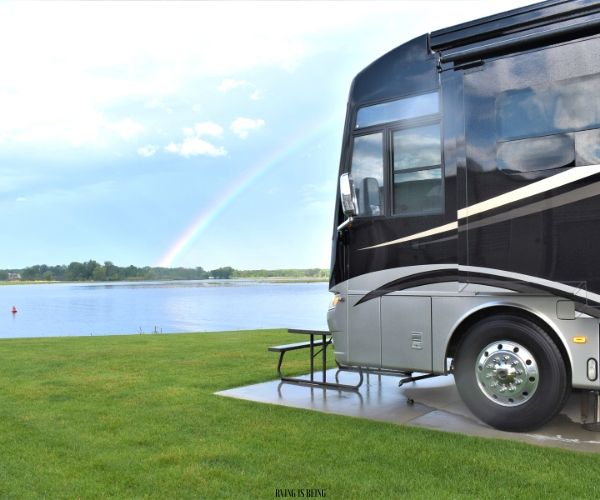
What is seasonal camping?
Seasonal camping is basically long-term camping for the season.
As the name suggests, a “seasonal,” is generally over an entire camping season, which typically runs from the months of April to October in many northern campgrounds. Head south, and you’ll find campgrounds and RV resorts offering seasonal sites on a three-month, six-month, or year-round basis.
Ultimately at any location, seasonal RVers tend to leave their camper right on-site for the extended duration, versus routine travel. This gives couples, solo travelers, or camping families an amazing place to retreat to; similar to a second home, getaway cottage, or vacation rental– but with their own RV parked on their own piece of paradise!
Why choose seasonal camping?
Having a seasonal site is like having a vacation home. Plus, it allows you to do what you love the most– GO CAMPING! After all, considering the money spent on nightly reservations, getting a seasonal may be cost-effective. With your own campsite for the season, you benefit from unlimited camping, not to mention using the site around your own schedule without the hassle of making reservations, limited availability, packing up the camper every trip, or driving an RV. We’ll go over a long list of amazing benefits below, but first, let’s cover some basics.
Differences between campground seasonals
While the overall long-term-camping idea stays the same, seasonal campsites differ considerably from location to location; most notably, the general atmosphere between campgrounds, parks, and RV resorts. Naturally, campgrounds encompass a more traditional, camp-like setting, where rustic charm gives a greater outdoor experience– oftentimes with basic or limited amenities. On the other hand, RV resorts and some upscale parks, incorporate a wider range of clientele conveniences in resort-like atmospheres. Check out: Campgrounds, RV Parks, RV Resorts… What’s the Difference?
Between these, you’ll find different price points; location being one of the biggest factors. Places in popular tourist areas tend to be more expensive than those in rural locations. Similarly, those with upscale amenities and modern facilities are also going to be priced higher.
At the same time, policies and operations differ among campground businesses. For instance, some RV parks only serve clientele 55 and older, while others tailor to younger crowds through hosting activities and events.
Additionally, there’s luxury RV resorts that are motorcoach exclusive, admitting Class A RVs only; whereas other campgrounds welcome every camper type except big rigs or large units due to their size or amperage. On the same note, some parks impose strict 10 year or newer guidelines, yet others are more lax on this policy.
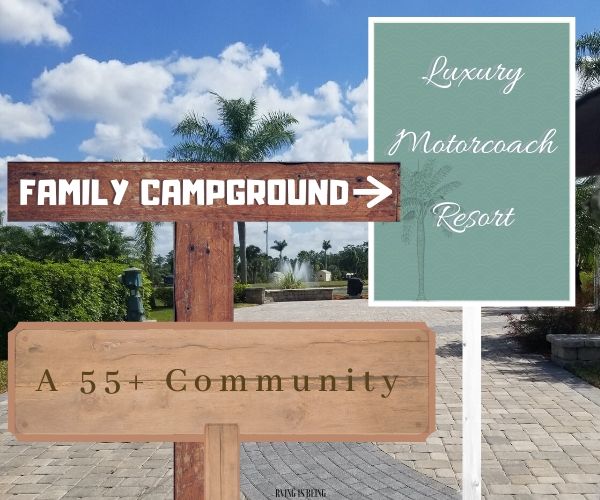
Although there’s vast differences between seasonal campground locations, it also makes it possible for almost every camper, couple, or family to find the perfect seasonal site that fits their bill, rig requirements, needs, and preferences. It just takes some searching!
Let’s Talk about Seasonal Camping!
What does a seasonal-site include?
Seasonal sites generally include the lot and site, hookups, campground facilities, amenities, and activities offered.
Take a look at these in detail:
Site Lot: This includes the area to park the RV unit as well as the yard. Depending on the campground location and atmosphere, lots can be inland, waterfront, heavily wooded, bare, or concrete. Lots can be undeveloped or include premium landscaping and hedge barriers.
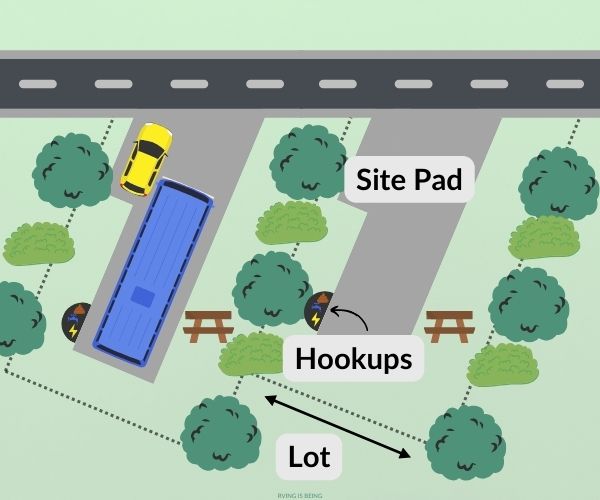
Site Pad: A site pad is the area your rig will be parked on with hookups nearby. It will either be back-in, pull-in (these are generally on waterfront sites), or pull-thru. The site pad itself can be anywhere from a gravel or a grass area, to a concrete pad or brick pavers. It generally includes space for the RV unit and at least one personal vehicle, if not two.
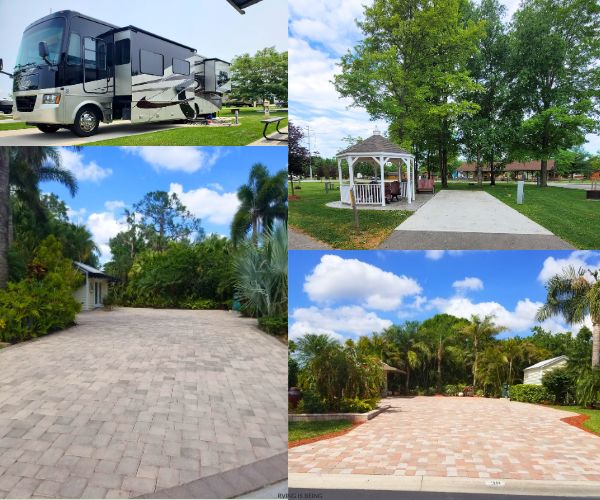
Hookups: Electric (30 amp and/or 50 amp service) and water hookups are typically provided onsite. If you hear “full-hookup” that means water, electric, and sewer are all conveniently available at the site. Otherwise, RV sewer service may be in the form of a dump station shared among the campground. In regards to this off-site system, campers either have to relocate their unit to empty the holding tanks at the dump station, or they can empty their tank contents into a portable holding tank and transfer it to the dump station. Alternatively, some campgrounds include a weekly RV pump-out service where a company arrives onsite for individual camper pump-outs.
Site Features: Seasonal sites can be unfurnished, providing campers room for their own outdoor furniture and gear. On the same note, sites can include a picnic table, firepit, patio area, porch swing, or storage shed. Look into upscale RV resorts and you’ll see spacious patios, sitting areas, permanent storage, corresponding boat slips, and even on-site coach houses!
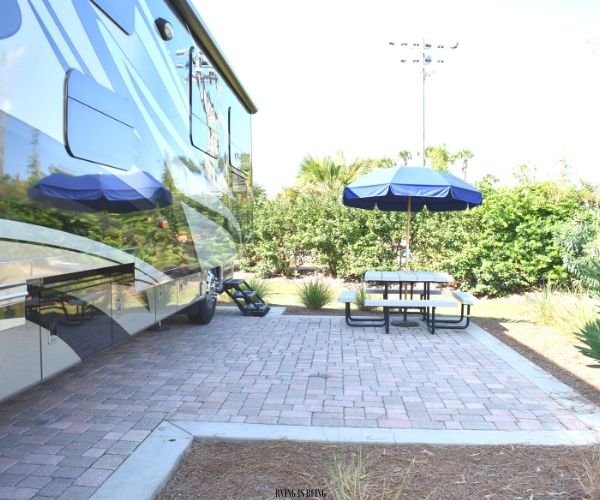
Facilities and Amenities: As a seasonal, you’d get full use of customer facilities and amenities on the property. These can include but are not limited to:
- gated access to property
- on-site propane
- bathhouses
- laundry facilities
- convenience store
- sports courts and playgrounds
- clubhouse, arcade
- mini golf
- gem mining
- pool and spa
- fitness center
- seasonal mailboxes
- communal kitchen
- docks/marina slips
- designated swimming areas, fishing ponds
- walking paths
- dog parks
- cable channels
- Wi-Fi
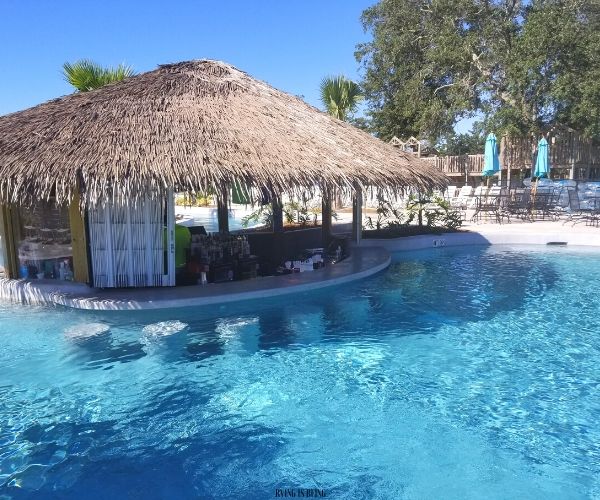
Activities: A seasonal perk is that you get to benefit from campground activities! Some places incorporate movie nights, game nights, arts and crafts, pancake breakfasts, or live music for campers to enjoy. Fitness, yoga, or swim pilates may be hosted encouraging health and wellness among the camp community. Others plan an abundance of activities for holidays like Christmas in July, Halloween and much more!
What else is included? UNLIMITED CAMPING!!! Having a seasonal campsite means that you get to camp as much as you want. Forget the hassle of making reservations or limited availability. The site is YOURS for the season!
Benefits of seasonal camping
Campground availability
Ever struggle to get a campground reservation due to limited availability? Some campgrounds book out months in advance, even a year! Regardless of the time of year, it can be downright impossible to get into a popular park. Having a seasonal means, your site is guaranteed. No reservations needed!
No set up or tear down
No more arriving late at night trying to back in, hookup, and unpack your belongings. In fact, the hard part is already done! You’ll arrive to the camper onsite, parked, hooked up, opened up, and stocked! When leaving, simply lock up and go. There’s no retracting slides, stowing breakables, hooking up the trailer, or towing it!
No white-knuckling it
Driving a large trailer or motorhome can be stressful! Not to mention the traffic and maneuvering through busy cities. Some find that hours on the road is simply not for them. Many choose the seasonal route to still enjoy the wonderful camping experience, but skip the driving, parking, and hours on the road.
No packing or unpacking
Anyone else feel like they need a vacation after unpacking from a vacation?! Staying on-site means no packing or unpacking after EVERY. SINGLE. TRIP.
Choice in the site
Almost all campgrounds let you pick, or at least have a choice in your desired seasonal campsite (depending on what’s available, of course). No more worrying about getting randomly plopped into a site you might not like.
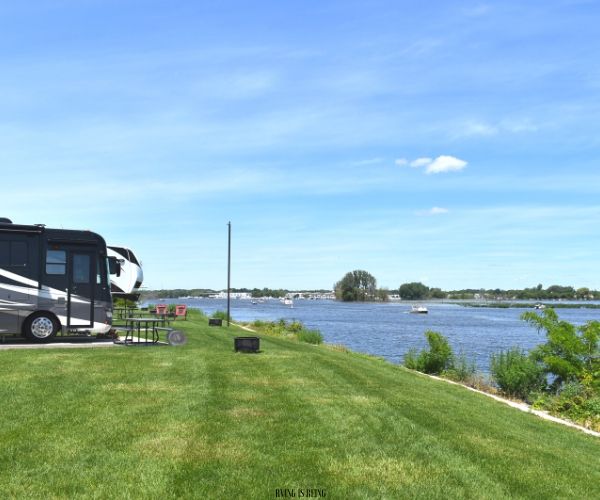
Amenities galore!
Having a seasonal site means having free rein of the amenities offered! You’ll never get bored of a pool, hot tub, mini golf, and sports courts. High speed Wi-Fi may come in handy for remote workers, where cable channels may be a luxury many don’t get at home. With a fitness center on site, forget the separate gym membership! And when you are ready to hit the showers, use the bathhouses instead of your RV’s, with on-demand hot water and spacious stalls!
RV storage
Having the camper on-site, ready to be used, is super convenient. Besides that, do you know what else it means? The RV is not at your house taking up the entire driveway, parked in your yard, or racking up fees in a storage facility. Speaking of storage, do you know that many RV parks offer seasonal campers onsite winter storage? By going this route, you’re not obligated to find an RV storage facility during the off-season winter months.
Affordability
Renting a seasonal site can be an affordable vacation option for those who frequently like to camp. Doing so may be well worth the price rather than paying nightly fees. Accordingly, staying stationary cuts down on gas you’d be using in the RV to travel. On the same note, seasonal camping also decreases trailer and tow vehicle wear and tear from traveling. As mentioned above, keeping it on-site eliminates RV storage facility fees. It’s also important to realize if you use the site for a majority of those six months– that’s utilities at home that you are not using–thus saving on (electric, water, cable, Internet).
Personalize your site
Many people love decorating their seasonal site, personalizing their own piece of paradise to retreat to. Depending on the policies and rules outlined in the seasonal contract, many permit small sheds (to store bikes, outdoor chairs, and other gear in) while others allow decks to be built, steps up to the RV, dock boxes, mosquito rooms, and other add-ons, making your site the perfect home away from home.
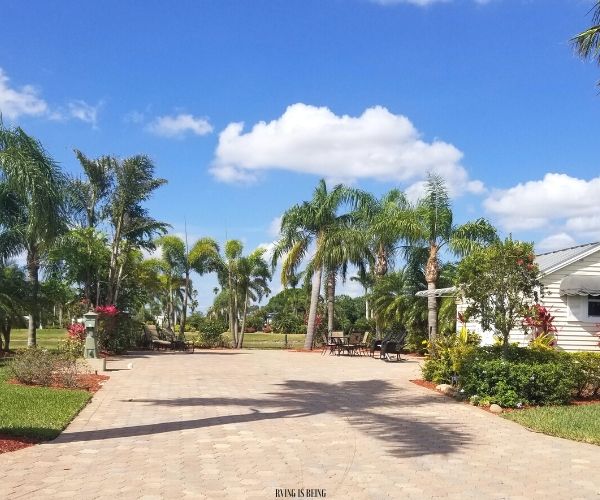
Improves wellness
A seasonal site gives us something to look forward to. Knowing a fun bonfire, nap in the sun, or kayaking activity is awaiting, increases our positivity and gives us that little extra boost of motivation needed to finish out the work week. Having a place to go– to retreat to– improves our mood and overall well-being as we can decompress, relax, and regroup in a positive atmosphere. Simply being outside, getting vitamin D and fresh air is great for our health. On the same note, the positive atmosphere may inspire you to take on a new outdoor hobby or two, join a group activity, or make new friends at game night!
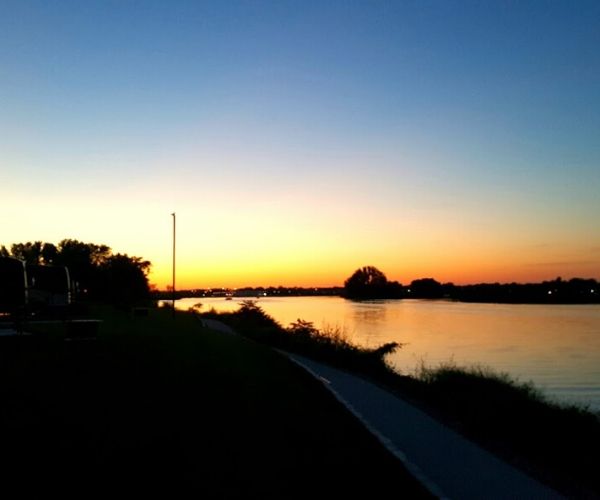
Commitment just for the season
Renting a seasonal site is like having a vacation home, yet it’s not as permanent. Sure, you are financially committed for the season, however, after the season ends you are free to pick a different campground or simply not sign any more seasonal contracts. Plus, if you decide that the seasonal life is not for you, no need to worry about selling your site. You get to walk away– or roll away, for that matter– with no strings attached.
Things to think about
It’s a big decision
Remember, this is a place that you will be spending a LOT of time at! It’s extremely important that you do your research, weigh the pros and cons, read the fine lines, and absolutely love the campground before hopping on the seasonal train!
Are requirements met?
This goes both ways. You’ll have to meet the business’s requirements while they must meet yours. For example, does the location have a “10 Year or Newer Rule” that would deny you from getting a seasonal site? Do they offer 50 amp service that your fifth wheel needs to run the ACs? Do they prohibit certain breeds of dogs?
At the same time, can you check-off the top amenities on your wish list such as a pool, fitness center, or laundry facility? What about a bark park for your furry companion tagging along? Do they offer dependable Wi-Fi for you to work remotely? Do they allow golf carts you can bring to maneuver through the property? Do they have a place for your boat and boat trailer? Do they offer onsite winter storage?
Answering these can quickly narrow down potential locations for a seasonal campsite.
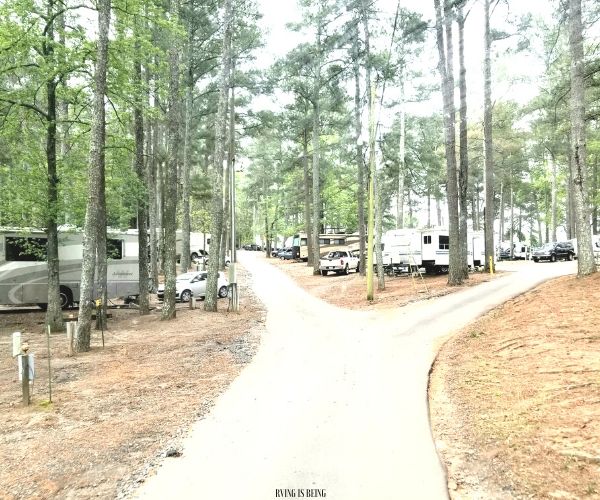
Everyone’s preferences are different when it comes to the “perfect” campground. To some, less is more, where camping is their retreat, getting away from the busyness, electronics, and enjoying nature and the peace it brings. On the other hand, some want the luxurious amenities, scheduled events, and sense of community where group settings and interacting is encouraged. There’s no right or wrong when narrowing down campgrounds to your preferences. It is purely about doing what you love and finding the right campground that compliments that.
Is it worth it?
Consider how much you will use a seasonal campsite. Many campers choose to live in their camper for the season– making it well worth the seasonal rate. If you are avid campers, getting a seasonal site may be a better financial route, rather than paying separate nightly rates throughout the season.
Pull out past reservation confirmations to help analyze the costs. How much did you spend on camping last year? Don’t forget to factor in fuel costs!
Despite the price of a seasonal, it’s not the only factor that makes a seasonal worth it. To many, unlimited availability, convenience of having the camper already there, and quality time together make it well worth the price tag.
Location
Unless you plan on living at your seasonal site for the term rented, you’ll want a summer seasonal close enough to commute to– but that still feels like a getaway. Choosing a location too far, may turn into a hassle. At the same time, consider what the location has to offer. Odds are, you’ll spend a lot of time at your seasonal campsite along with exploring the area. You may prefer a location with shopping, dining and tourist attractions over a rural location with less going-ons.
How much does seasonal camping cost?
A rented seasonal site can start anywhere around $1,000 and go up from there– even reaching $10,000. Although prices vary considerably from one end of the spectrum to the other, they greatly depend on: 1.) the campground or resort’s location and 2.) the amenities they offer.
Naturally, an RV resort on the oceanfront is going to start at a higher price point than an inland resort. Likewise, a campground near a tourist town or near well-known attractions will be priced more than those outside of the same city offering similar amenities.
Additionally, you’ll find many parks have seasonal pricing tables. For instance, waterfront sites and full hookups typically find themselves at the top of the tier, while inland sites with full hookups would be next, then down to inland sites with only water and electric hookups being the least expensive out of the set.
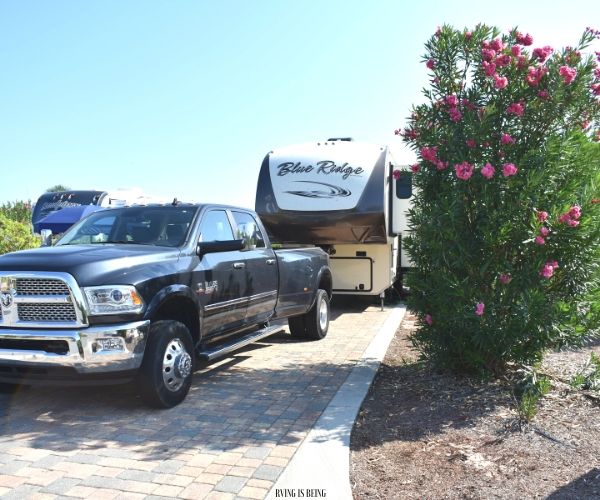
Other costs often overlooked
Aside from the big price tag on seasonal lots, take into consideration other expenses associated with renting.
Electric Onsite, your RV will require 30 amp or 50 amp power. Usage can be managed a couple different ways. For one, it can be all inclusive with seasonal rent. Secondly, campgrounds can charge an additional $X amount each month for each air conditioner and/or refrigerator your rig has. Thirdly, a campground may charge an additional flat rate for each camper’s electric usage each month. (For example, every camper pays $50 a month for electricity regardless of the camper unit type or how many AC’s it includes.) Fourthly– and the most common way many locations manage seasonal electricity– is that sites are individually metered and each camper pays for what they use each month. Charges are either paid to the RV park or to the utility provider.
Cable and WiFi Many campgrounds include these convenient amenities, while some charge an extra fee to use them. Keep in mind that even if WiFi is free, it may not be the best. I think we’ve all experienced this in a busy campground… Hundreds of people bog it down making it impossible for those who work remotely. Some resorts have an upgraded Internet package or “VIP WiFi” available to seasonals for an additional monthly fee. Factor these costs in if required for your camping experience.
Sewer If sewer is not included onsite, campgrounds may include weekly pump-out services with advance payments. Plan ahead for this added fee, otherwise, consider purchasing a portable holding tank to transfer to the dump station.
Late fees and other fees Don’t get caught missing the deadline for season rent as unpaid balances can incur late fees. The best way to avoid these is to see if the campground has an automatic payment plan to ensure you never miss the due dates! Additionally, failure to follow the contract guidelines can result in fees as well. It is extremely important to fully understand contract policies and campground rules before signing the dotted line!
Lot maintenance Businesses may charge an additional fee for lot maintenance or include this in your overall seasonal rate. Nonetheless, make sure you are aware and that the contract states what exactly this entails. Will the campground take care of lot maintenance such as lawn mowing, weed whacking, landscaping, branch removal, and garbage pickup at your site? If not, consider what it’s going to cost you for upkeep.
RV maintenance Aside from lot maintenance, a point often disregarded is RV maintenance. Even though your RV is stationary, it will most likely get used quite often. Routine maintenance and upkeep is crucial no matter if it’s rolling down the road or not. Plan for expenses going into RV maintenance, service and repairs, and cleaning supplies. Remember, you not only have a large investment in a seasonal site, but an even bigger investment in an RV.
Winter storage Some campgrounds charge a flat rate for winter storage. However, many parks generously include winter storage with a seasonal site commitment to the following year. Generally this will require a non-refundable deposit for next year’s seasonal site in order to store your camper during the winter. Additionally, many campgrounds have an on-site winterization service to winterize campers. While this is an additional fee, fortunately many campgrounds offer winterization at a discounted price– due to the amount of units being winterized at once through a professional company.
Number of campers and visitors Your seasonal contract will list a certain number of people permitted to be onsite. Additional people may be an upcharge. On the same note, many campgrounds charge for having visitors. Although generally a small fee, this can definitely add up throughout the camping season if you plan on having visitors frequently.
Firewood Most campgrounds prohibit bringing outside firewood on the property. Although state regulations vary, you’ll frequently find this policy plain as day within the contract. Plan for some funds going in this direction. A five dollar bundle can add up throughout the season! Check with the office to see if they offer seasonal firewood bundles or discounts for long-term campers.
Activities and attractions Whether you stay onsite to enjoy the campground’s activities or explore the surrounding city; factor in costs you may be spending during the season. For example, campground activities and events may require a small fee to participate. At the same time, night’s out dining or shopping around town are also potential costs to factor in your seasonal budget.
Contract policies
With a seasonal comes a contract… Although we may slightly cringe when we hear this word, a contract is in place to protect both the business and the customer.
Request a copy of a seasonal contract. After all, doing so should be one of the very first steps when considering a campground seasonal. It’s necessary for comparing campgrounds, noting different elements, understanding policies, and overall making a well-informed, educated decision.
Read the contract thoroughly on your own time. Ask questions! (Tip: Email, email, email! When it comes to questions over the contract it’s ALWAYS best to get things in writing — from a business side and customer side.)
Do this, before getting a seasonal
Research
- Start researching campgrounds, parks, or resorts within an appropriate distance.
- Look at campground photos and read the reviews. Get an overall feel of what others think about the campground.
- Request seasonal information and a seasonal contract to thoroughly look over on your own time.
Put Ideas To Paper
- Put some ideas on paper. Is a seasonal worth it?
- Analyze costs. Add up potential seasonal rates and estimate in other costs such as electric, maintenance fees, activities, and/or attractions nearby.
- Also take into account the miles and time it takes to get there. Think about the drive during the busy summer months.
- Compare and contrast possible campground choices! List the pros and the cons along with differences in distance, amenities, attractions nearby, and prices.
Visit the Campground or Resort
- The best thing you can do when considering a seasonal is visit the campground in mind and experience it for yourself! CAMP THERE!
- Get a feel for what the drive and traffic will be like on your way to and from your potential seasonal site. After all, you’ll be making the trip a lot!
- Check out all of the facilities, walk the property, and meet other seasonals and staff. Are the facilities in good order? Are the bathhouses clean? Is the property well maintained? Are campsites sites clean and orderly? Does it seem too rowdy at night? Are rules enforced like they should be? Do you feel safe?
- Get a feel for the atmosphere. Can you see yourself there for the entire season?
RVING IS BEING on-site for the season!
Related posts
3 Comments
Leave a Reply Cancel reply
This site uses Akismet to reduce spam. Learn how your comment data is processed.
Today's pick
Hot topics
Disclosure: This website contains affiliate links, meaning we will get a commission if you decide to make a purchase through the links, at no additional cost to you. Additionally, this website is an Amazon Associate. As an Amazon Associate, the owner of this website earns a commission as a result of certain qualifying purchases. CERTAIN CONTENT THAT APPEARS ON THE SITE TO WHICH THIS SITE LINKS ARE AFFILIATE LINKS. THIS LINKED CONTENT IS PROVIDED “AS IS” AND IS SUBJECT TO CHANGE OR REMOVAL ANY TIME. Please read this Site’s disclosure and privacy policy & terms for more information.
Categories
- Children & Family (15)
- Cookout Gear & Accessories (6)
- Food (2)
- Guide (37)
- Health (5)
- Holidays (10)
- List (10)
- Maintenance & Repair (10)
- Printables (4)
- Products & Accessories (40)
- Quote (3)
- RV & Campsite Setup (23)
- RVING (78)
- Shop Page (36)
- Storage & Organization (2)
- Tech (4)
- Travel (22)

I liked how you said that you can personalize your site. My friend was talking about camping with her RV next summer. I can almost see all of the decorations she would put up to make the site feel like home.
If you are worried about WiFi get a satellite internet system (StarLink or similar). You can get all of your subscription services and not worry about usage clogging up the park WiFI.
Great article! I found the blog to be both informative and well-presented. Keep up the good work.